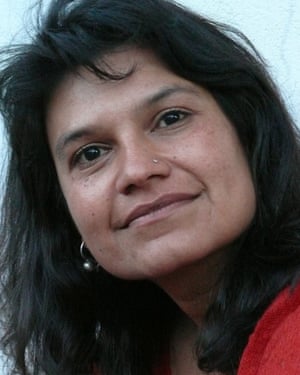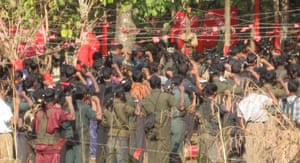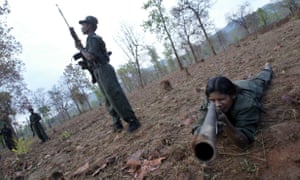Nightmarch by Alpa Shah – among India’s Maoist guerrillas
 |
| Alpa Shah, LSE, Photograph: Hurst Publishing |
An anthropologist’s nuanced account of life with India’s revolutionary movement, including her 250-km trek, disguised as a male soldier, with a rebel platoon
The Indian government claims 20 of the country’s 28 states are affected. In reality, the Maoist operation is centred on central-eastern India: above all, on parts of Andhra Pradesh, Bihar, Chhattisgarh, Jharkhand and Odisha. It owes its survival to Maoist groups’ readiness to attack some of India’s socioeconomic enormities, such as the hierarchical violence of the caste system and racist exploitation suffered by adivasis. In the new millennium, the Maoists have gained further traction by linking their cause to environmental protests. After 2003, the Indian state – ambitious to increase taxation revenues – began granting lucrative mining contracts to multinational corporations, especially in mineral-rich Chhattisgarh and Jharkhand. Maoist insurgents organised locals into resisting state and corporate efforts to empty land ready for industrial development. A witness to state and corporation encroachment on tribal land rights, Shah describes “the juggernaut of perhaps one of the greatest people-clearing operations of our times”. Successive Indian governments have demonised and even criminalised any connection with or whiff of sympathy for the Maoist cause. In June this year, five human rights activists – defenders of civil society from state attacks – were arrested on charges of “Maoist links”. In August, at least five more were detained on the same pretext. Shah, by contrast, humanises the Maoists she meets. She evokes the self-sacrificing idealism of the movement’s leadership. Many senior Maoists were born into high-caste, educated clans, were swept up in global protest movements of the 1960s and 70s, then abandoned their families and elite career prospects to fight as full-time revolutionaries for some of India’s poorest people. Shah notes how Gyanji, the leader of the platoon with whom she marched, still retains the tender, light-skinned feet of his high-caste upbringing, 25 years after joining the Maoist “Jungle Sarkar” (forest state). He is in some ways an unlikely guerrilla, seemingly more interested in “the dance of starlings” and “European and Hindi-Urdu poetry” than in landmines. She is attentive also to the stories of rank-and-file adivasis, who join the Maoists for a bewildering variety of reasons. In the early 2000s, the Indian government sponsored the creation of local vigilante armies to fight Maoist control. Their scorched-earth destruction of villages accused of helping or harbouring Maoists drove many adivasis into the People’s Liberation Guerrilla Army. Others have smaller-scale grievances. A 16-year-old called Kohli ran away to the Maoists because his father slapped him for spilling a small cup of milk. For some, joining the Naxalites is an adolescent rebellion, a way of escaping the control of their families and experiencing the world beyond their village. Maoist guerrillas and tribal rebels threaten India's industrial boom
 |
| A Maoist conference in a forest, from Nightmarch. Photograph: Alpa Shah |


NOTA BENE: both of my sibblings, Tomás Hinrichsen Zabaleta and Yanina Hinrichsen, have been very lucky. Both of them have been talking to me on their weekends' visits from a long time about their lovely,lovely friend and colleague Alpa. But it was only some days ago I was able to put a face to their dearest Alpa. Of course, I am very proud of them three, and therefore, encouraged by their friendship to keep writing the drafts of one my six unpublished manuscripts of memories. The last one is called 'Feminism and Revolution: reflexions of a militant'. Thank you so much, Alpa, Tomás and Yanina for being. THANKS also to the persons playing a crucial rol in keeping me thinking about a time nearly lost in the trauma of exile from both Chile (1973) and Argentina (1976): my former compañerxs of the MIR(Chile)Ester Cid Hernández(of La Moche), and Julián Bastías Rebolledo (MCR).Dr. Marta R. Zabaleta
ResponderBorrar